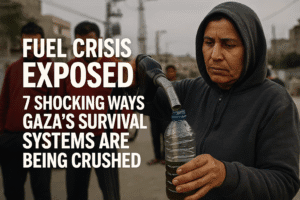Fuel Crisis EXPOSED: 7 Shocking Ways Gaza’s Survival Systems Are Being Crushed
A dire humanitarian crisis is unfolding in Gaza, where fuel scarcity is systematically dismantling life-sustaining systems. Since mid-April, Israel has blocked 29 of 35 UN fuel missions to Rafah, with over half of all humanitarian movements denied just this week. Without fuel, hospitals lose power, vaccines spoil, surgeries halt, and water systems collapse—leading to sewage floods, disease outbreaks, and overwhelmed clinics. Communications break down, aid convoys get lost, and families remain disconnected in chaos.
Critical aid—food, water, road access—is routinely denied, targeting Gaza’s most vulnerable. The World Food Programme’s delivery—just 6,000 metric tons of food for 2.1 million people—is a fraction of what’s needed. International humanitarian law, though clear, is unenforced, turning rules into empty promises. As Gaza’s generators fall silent, the world must ask: are we prepared to protect civilians when power overrides law and humanity itself is at stake?

Fuel Crisis EXPOSED: 7 Shocking Ways Gaza’s Survival Systems Are Being Crushed
UN Deputy Spokesperson Farhan Haq’s June 12th briefing revealed a critical pattern: Israel has blocked 29 of 35 UN attempts to access Rafah’s fuel reserves since mid-April. Simultaneously, 50% of coordinated humanitarian movements inside Gaza were denied this week alone. This isn’t bureaucratic friction—it’s suffocating systems that sustain life.
Why Fuel = Survival
Fuel’s absence triggers cascading collapse:
- Health Catastrophe: Vaccines spoil without refrigeration; surgeries halt mid-procedure. Hospitals become buildings without function.
- Water & Sanitation Death Spiral: Pumps stop → sewage floods streets → cholera risks explode → more patients overwhelm powerless clinics.
- Communication Blackout: No fuel for telecom generators means ambulances can’t coordinate rescues, families can’t find missing relatives, and aid convoys navigate blind.
The Denial Playbook
Israel’s rejections target foundational needs:
- Blocked water trucks to northern Gaza’s dehydrated communities
- Refused road repairs that would allow aid transport
- Stalled nutrition supplies while children face acute malnutrition
Each refusal exploits a loophole in humanity’s emergency response systems.
Aid Math vs. Human Need
The World Food Programme’s numbers tell a devastating story:
- 6,000 metric tons of food entered Gaza since May—enough for <300,000 people for one month.
- Gaza’s population: 2.1 million.
- Pre-war aid flow: 600-800 trucks daily. Current flow: A fraction of one day’s pre-war volume stretched over weeks.
International Law’s Broken Shield
Haq’s reminder—“International humanitarian law is crystal clear”—underscores the grim reality: Even binding statutes lack enforcement teeth. When states can systematically deny life essentials without consequence, the law becomes parchment armor.
The Unseen Casualty: Future Generations
Beyond immediate deaths (officially >55,000), the slow violence of fuel starvation guarantees long-term devastation:
- Children surviving malnutrition face lifelong cognitive/physical impairment
- Collapsed sanitation breeds disease time-bombs
- Lost education and trauma scar societal recovery for decades
Conclusion: The Litmus Test for Humanity
This isn’t just about fuel tanks—it’s about whether our global systems can protect civilians when power ignores rules. As generators sputter silent across Gaza, the world faces a question: Will we watch systems collapse, or forge new tools to uphold the most basic covenant of human dignity?
You must be logged in to post a comment.